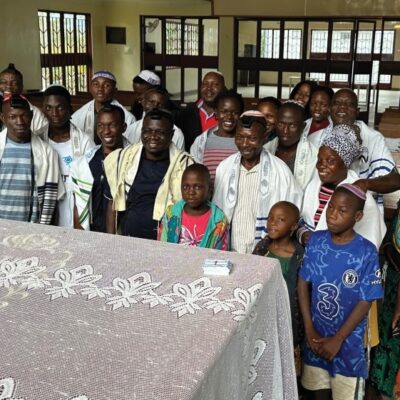Opinion
THE MESSAGE MATTERS
7 tips for impactful fundraising in a post-Oct. 7 world
The Jewish people are interconnected, our lives forever intertwined. Life changed for our Israeli brothers and sisters on Oct. 7, but it’s become clear in the days and months since that life for American and world Jewry has changed as well. As a practicing Jew in my personal life and a fundraising consultant in the Jewish community in my professional life, I have been grappling with what this means for myself and my clients.
The Anti-Defamation League’s Audit of Antisemitic Incidents in 2023 reported 8,873 antisemitic incidents in 2023, a 140% jump from the 3,698 incidents in 2022 — the highest number on record since the ADL began tracking antisemitic incidents in 1979. These increases have been seen across all categories including assault, vandalism and harassment.

Image by MissionBox
Here’s the brutal truth: American Jews feel less safe than they did last year. A survey conducted by the American Jewish Committee found a 22% increase in this sentiment, with young Jews in particular more likely to report experiences of antisemitism. On college campuses, a significant number of Jewish students are hiding their identities or avoiding discussions about Israel in response to this fear.
As a consultant, I am constantly looking ahead to try and anticipate the needs of our organizations and their donors. In recent months, I have wondered what this new landscape would mean for Jewish philanthropy and how we can connect with donors during this difficult time.
In a recent report on American Jewish philanthropy by Indiana University Lilly Family School of Philanthropy and the Ruderman Family Foundation, data showed that those who have experienced antisemitism are more philanthropic — and we’re not just talking about a slight increase. The data is striking: Individuals who have faced antisemitism donated an average of $35,425. That’s two and a half times more than those who are simply concerned about antisemitism, and almost ten times more than those who haven’t experienced it.
Even more interesting is that this increased giving extends beyond religious causes. Those affected by antisemitism are donating over six times more to non-religious organizations compared to their unaffected counterparts. This suggests a broader trend of increased philanthropic engagement in the face of adversity.
Fundraisers are struggling to pivot their messaging in this post-Oct. 7 world. I understand that organizations don’t want to recreate the wheel. As fundraisers, we’re used to reusing (or tweaking) the same High Holidays language and annual campaign messaging year after year. But unfortunately, those solicitations will not work in today’s climate.
If your organization has a direct tie to Israel or combating antisemitism, it may be more clear how to adapt your language and highlight the work you’ve done to support the Jewish community in the past ten months. But for many Jewish organizations, it’s not so simple. And even if your work is directly tied, how can you best leverage this moment to continue fundraising effectively?
Here are seven ways to pivot your fundraising in a post-Oct. 7 world:
- Reframe your message: The Jewish community has evolved over the past year. Your messaging needs to reflect the current climate of unity and resilience in the face of increased antisemitism. Highlight how your work is relevant to these pressing issues. And I’m sorry, but this means creating new language — not recycling last year’s messaging.
- Show relevance: Whether or not your organization deals directly with Jewish security or protection, find ways to connect your mission to the current situation. Are you building future Jewish leaders? Fostering Jewish pride? Protecting vulnerable community members? Emphasize these points.
- Highlight collaboration: If your organization isn’t directly combating antisemitism, highlight partner organizations that are or any relevant collaborations you’ve participated in.
- Encourage solidarity: Remind donors that supporting Jewish philanthropy is also about coming together and strengthening our community. This collective effort is crucial in times when Jews feel isolated and threatened.
- Highlight specific programs: Focus on programs that build Jewish identity, enhance security, support vulnerable individuals, promote social justice or foster interfaith understanding. Make it clear how each donation makes a tangible difference.
- Embrace vulnerability: Acknowledge and validate the fear and insecurity that people are feeling. This is an opportunity to get more vulnerable in your messaging and share how you personally or your community have been impacted since Oct. 7.
- Speak to younger Jews directly: We know that younger Jews are less likely to give and be involved in the Jewish community. But in the face of rising antisemitism on college campuses and social media, we have an opportunity to connect with them right now. I encourage you to create segmented donor lists and specific messaging that speaks to the problems young Jews are facing (fear of what their future will look like, unsure how to navigate antisemitism at school, loneliness and lack of community, etc) and how your organization might be able to support them in navigating these issues.
If you’re wondering how to put this into action at your organization, download a sample year-end appeal email that addresses the rising antisemitism facing the Jewish community.
Judith Frankiel is a senior associate consultant at Evolve Giving Group, a consulting firm that provides people-first talent, strategy and fundraising services to nonprofits.













